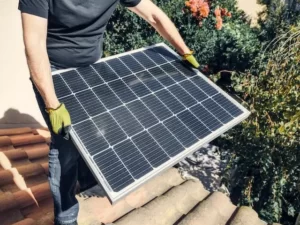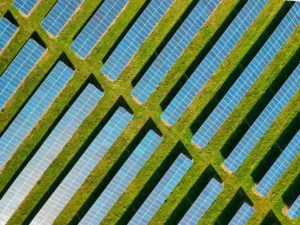While solar energy has many advantages, there are some downsides you should consider. To begin with, the initial investment can be high, though financing options may help. You'll also need to budget for ongoing maintenance, like cleaning and potential inverter replacements. Space limitations on your roof may restrict panel installation, and aesthetic factors could affect your home's appearance. Energy production can vary with weather, impacting efficiency. Additionally, local regulations might pose challenges. Understanding these factors can help you make an informed decision. If you want to explore these aspects further, more insights await you.
High Initial Investment
When you look into going solar, one of the biggest hurdles you'll face is the high initial investment. However, various financing options can help ease this burden. Many homeowners qualify for tax incentives, which greatly reduce costs. The installation process can also vary in price, depending on the technology advancements used in solar panels. While your upfront costs may seem intimidating, consider the long-term savings on energy bills and the potential for greater energy independence. Reducing grid dependence is another factor to weigh. Additionally, don't forget to factor in insurance considerations for your solar system. When you assess these elements, you'll see that investing in solar could be a smart financial decision in the long run.
Ongoing Maintenance Costs
When you invest in solar panels, it's important to take into account the ongoing maintenance costs that come with them. Regular cleaning is necessary to keep your panels functioning efficiently, as dirt and debris can reduce their energy output. Additionally, you'll need to budget for inverter replacements, which typically occur every five to ten years, ensuring your system continues to operate at peak performance.
Regular Cleaning Requirements
Solar panels can accumulate dirt, dust, and debris, which can hinder their efficiency. Regular cleaning is essential to maintain peak performance, and the cleaning frequency can vary based on your location and environmental conditions. Neglecting dirt accumulation can lead to decreased energy production and increased costs over time.
Here's a quick look at the impact of dirt on solar efficiency:
| Cleaning Frequency | Dirt Accumulation | Efficiency Drop |
|---|---|---|
| Monthly | Low | 2% |
| Quarterly | Moderate | 5% |
| Bi-Annually | High | 10% |
| Annually | Severe | 15% |
| Neglected | Extreme | 30%+ |
Investing in professional cleaning services can help guarantee your system runs efficiently and effectively, protecting your investment.
Inverter Replacement Costs
While solar panels are designed to last for decades, the inverters, which convert the solar energy into usable power, typically have a shorter lifespan of about 5 to 15 years. This means you'll likely need to replace your inverter at least once during the life of your solar system. The cost of inverter replacement can vary, often ranging from $1,000 to $3,000, depending on the inverter efficiency and model you choose. Higher-efficiency inverters tend to cost more but can provide better performance over time. It's essential to factor in these ongoing maintenance costs when considering solar energy. Regularly monitoring your inverter's performance can help you anticipate replacement needs, ensuring your solar system operates at its best.
Space Requirements
When contemplating solar energy, you need to think about space requirements. Whether it's the land area or your roof's capacity, these limitations can impact your installation plans. Additionally, it's essential to contemplate how solar panels might affect your property's aesthetics, as these factors play a significant role in your decision-making process.
Land Area Limitations
As you consider the installation of solar panels, one significant factor to keep in mind is the land area limitations associated with this renewable energy source. Solar farms can lead to land degradation and habitat disruption, which may raise concerns about ecological balance. Additionally, the agricultural impact can be significant, especially in areas where farming is essential. Zoning restrictions might also limit where you can place solar installations. Some communities may show opposition due to these concerns, complicating the process further. You may face installation challenges related to land use, which can affect your decision. It's crucial to evaluate these factors carefully to guarantee that solar energy aligns with your environmental and community goals.
Roof Space Constraints
Often overlooked, roof space constraints can considerably impact the feasibility of solar panel installation. If your home has limited roof space, it may restrict the number of solar panels you can install. This limitation can affect your system's efficiency and overall energy output. Additionally, the solar panel orientation is vital; ideally, panels should face south to capture maximum sunlight. However, if your rooftop design doesn't allow for this ideal positioning, you might not get the energy savings you expect. It's important to assess your roof's area and design before proceeding with installation. Consulting with a solar expert can help you understand your options and guarantee you're making the most of your available space for solar energy generation.
Aesthetic Considerations
While solar panels can greatly reduce energy costs, their visual impact on your home's exterior is an essential factor to take into account. Consider the panel design and color options available, as they can influence visual integration with your home's architectural styles. It's important to assess how solar panels will affect neighborhood appeal and whether they align with local historical context. Homeowner preferences vary, and some may prioritize aesthetics over energy savings. Additionally, think about landscaping compatibility, as well-placed trees or shrubs can both enhance beauty and impact solar efficiency. By carefully considering these factors, you can make an informed decision that balances energy needs with your home's visual appeal.
Energy Production Variability
Although solar energy offers numerous benefits, one significant downside is the variability in energy production. Factors like weather impact and seasonal variations can affect your system's reliability. On cloudy days or during winter months, you might notice a drop in energy efficiency, leading to increased grid dependence. This unpredictability makes production forecasting essential. Technology advancements have improved solar systems, yet challenges remain. Energy policies can also influence how much energy you can rely on. It's important to assess your energy needs and consider backup options. By staying informed and understanding these variables, you can make wise decisions about your solar investment, ensuring a more reliable energy future.
Aesthetic Concerns
Energy production variability isn't the only concern when considering solar panels; aesthetic issues also play a significant role. Many homeowners worry about how solar panel design will affect the appearance of their property. If the panels clash with the existing architecture or landscape, it can detract from your home's curb appeal. To address these concerns, manufacturers now focus on visual integration, creating panels that blend more seamlessly with roofs. Options like solar shingles are designed to mimic traditional roofing materials, providing a more unified look. When planning your solar installation, consider consulting with professionals who specialize in aesthetically pleasing designs. They can help you choose solutions that enhance your home's beauty while still being energy-efficient.
Limited Energy Storage
When considering solar panels, one significant drawback is the limited energy storage capacity associated with many systems. While solar panels can provide you with energy independence, the amount of energy you can store for later use largely depends on battery technology. Current battery systems often struggle to hold enough energy to meet your needs during cloudy days or at night. This limitation can lead to reliance on the grid during those times, which may reduce your overall energy independence. Additionally, upgrading to more advanced battery systems can be costly. It's essential to evaluate your energy consumption patterns and consider how much energy storage you'll require. This way, you can make informed decisions about your solar investment.
Local Regulations and Permits
Maneuvering local regulations and permits can feel like a challenging task for homeowners considering solar energy. You'll need to navigate zoning restrictions and installation guidelines specific to your area. Be prepared for potential permit delays, which can slow down your project. Some local incentives may help offset compliance costs, but understanding these programs requires careful research. Additionally, neighborhood policies can affect the type of system you can install. Keep an eye on regulatory changes and utility regulations, as they can impact your overall experience. It's essential to consult with local authorities or professionals who are familiar with these requirements. By staying informed and proactive, you can simplify the process and enjoy the benefits of solar energy.
Impact on Home Value
Understanding local regulations and permits is just one part of the solar energy equation; another important factor to take into account is how installing solar panels can impact your home's value. Many homeowners wonder if solar panels will boost their home appraisal or resale value.
| Impact Factor | Positive Effect | Neutral/Negative Effect |
|---|---|---|
| Home Appraisal | Increased marketability | Potential buyer concerns |
| Resale Value | Higher offers in some markets | Varies by location and buyer |
| Energy Savings | Lower utility bills | Initial installation costs |
While solar energy can appeal to eco-conscious buyers, it's essential to research local market trends. The value addition often depends on the area's receptiveness to solar technology.
Environmental Impact of Production
Although solar energy is often touted as a clean and renewable source, the environmental impact of solar panel production can be significant. Manufacturing emissions can contribute to air pollution, while resource depletion occurs as materials are sourced for production. The extraction of these materials often creates ecological footprints that can harm local ecosystems. Additionally, the production process generates toxic waste, raising concerns about disposal methods. Energy payback periods vary, meaning it can take time for the energy produced to offset the energy used in manufacturing. A lifecycle analysis can help assess these impacts, but recycling challenges for solar panels remain. Understanding these factors is essential for making informed decisions about solar energy and its overall sustainability.
Frequently Asked Questions
Can Solar Panels Work During Cloudy or Rainy Days?
Yes, solar panels can still generate electricity during cloudy or rainy days, though their solar efficiency may drop. Weather impact affects performance, but they'll continue to produce energy, ensuring you're still harnessing solar power.
Do Solar Panels Attract Lightning or Cause Fire Hazards?
You might worry about lightning strikes or fire safety with solar panels, but they're designed to withstand storms. Proper installation minimizes risks, ensuring your system's safe and effective without considerably increasing hazards.
How Do Solar Panels Affect My Homeowners Insurance?
Solar panels can impact your homeowners insurance. You might need to discuss policy adjustments with your insurer to guarantee adequate insurance coverage. They may require a review to account for the added value and potential risks.
Can Solar Installations Be Removed Easily if Needed?
Yes, solar installations can be removed, but it involves a careful installation process. You should consider potential removal costs, as they can vary based on the complexity of your setup and any repairs needed afterward.
Are There Any Tax Incentives for Installing Solar Panels?
Yes, there're tax incentives available for installing solar panels. You can benefit from federal incentives and state rebates that greatly reduce your installation costs, making it an even more attractive option for your home.
Conclusion
While solar energy offers many benefits, it's important to contemplate the downsides. High initial costs, ongoing maintenance, and energy production variability can impact your decision. Additionally, space requirements and local regulations may pose challenges. However, understanding these factors can help you make an informed choice. We're here to guide you through the process, ensuring you have the knowledge needed to weigh the pros and cons of solar energy effectively. Your satisfaction and success are our priorities.



